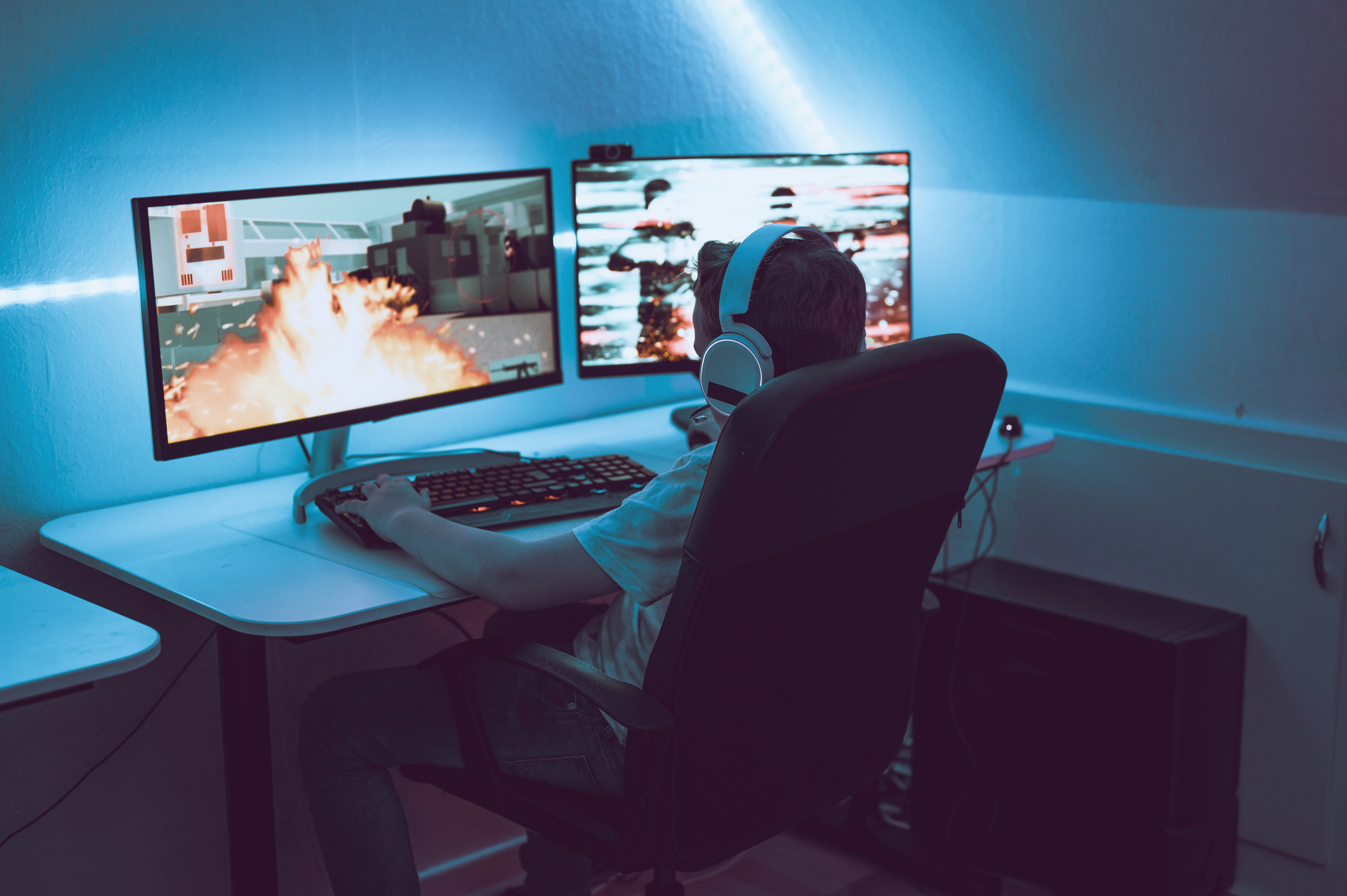Video games have evolved from simple, pixelated pastimes into highly immersive, complex experiences that attract millions of players worldwide. They are no longer just a form of entertainment; video games are a dominant cultural phenomenon that shapes how we socialize, learn, and even perceive reality. As gaming continues to grow in popularity, it has sparked debates about its psychological effects. While many studies focus on the potential negative impacts of video games, such as addiction or violent behavior, others highlight the positive aspects, including improved cognitive function, stress relief, and social connections.
In this article, we will explore both the positive and negative psychological effects of playing video games, examining how they can influence cognition, behavior, emotions, and social relationships.
Positive Psychological Effects of Playing Video Games
Enhancing Cognitive Skills
One of the most well-documented positive effects of playing video games is the enhancement of various cognitive abilities. Many video games require players to think quickly, solve problems, and strategize, all of which contribute to the development of critical thinking and decision-making skills.
- Improved Memory and Learning: Action games, puzzle games, and strategy games can significantly improve short-term memory and spatial reasoning. For example, games like Portal and Tetris challenge players to recall and manipulate shapes, which helps strengthen visual-spatial memory. Additionally, video games that involve complex storylines and character development, such as role-playing games (RPGs), often require players to retain information, improving both long-term and working memory.
- Enhanced Problem-Solving Skills: Many video games, particularly puzzle or strategy games like The Legend of Zelda or Civilization, encourage players to think critically and solve problems within a set of rules. By navigating challenges and overcoming obstacles in the virtual world, players practice complex decision-making and learn how to handle multifaceted problems, which can be transferred to real-world situations.
- Multitasking and Attention: Video games, particularly fast-paced action games like Call of Duty or Overwatch, demand high levels of attention and multitasking. Players must monitor their surroundings, react quickly to changes, and coordinate multiple actions at once. Studies have shown that frequent gaming can improve the brain’s ability to multitask and process visual and auditory information more efficiently.
Stress Relief and Emotional Regulation
Another positive aspect of video games is their ability to provide emotional release and stress relief. In a world filled with everyday pressures, gaming offers an escape from reality that helps individuals relax and unwind.
- Immersion and Escapism: Many gamers turn to video games for escapism, allowing them to immerse themselves in different worlds and temporarily forget about their worries. For some, this escape can be a form of emotional regulation, providing a sense of control and mastery in a world where they may feel powerless. Games like The Elder Scrolls V: Skyrim or Animal Crossing provide immersive environments where players can experience a sense of achievement and satisfaction.
- Reduction of Anxiety and Depression: Video games can serve as a coping mechanism for individuals dealing with anxiety or depression. Games that focus on exploration, creativity, and non-violent gameplay, such as Minecraft or Stardew Valley, can help players experience relaxation and satisfaction without the pressures of competition or high-stakes outcomes. Studies have shown that playing video games can provide temporary relief from symptoms of anxiety and depression by diverting attention away from negative thoughts and providing a sense of accomplishment.
- Mood Enhancement: Games that encourage positive social interactions or reward progress can have a significant impact on mood. Games with bright, engaging visuals, cheerful music, and positive reinforcement create a pleasurable experience that can boost players’ spirits. Even competitive games, when played in moderation and with friends, can help release endorphins and increase feelings of well-being.
Social Connectivity and Teamwork
Contrary to the stereotype of the solitary gamer, modern video games often encourage social interaction and collaboration. Online multiplayer games, in particular, allow players to connect with others from around the world, creating a sense of community and shared experience.
- Building Social Relationships: Online multiplayer games, such as Fortnite, League of Legends, and World of Warcraft, allow players to interact with others in real-time, fostering social connections that can lead to lasting friendships. Gamers often join guilds or clans and engage in cooperative play, working together to achieve common goals. These social interactions can help improve communication skills, teamwork, and cooperation.
- Support and Belonging: For some individuals, video games provide a sense of belonging that they may not experience in other areas of their life. Online communities and gaming groups often serve as a support system for individuals who feel isolated or disconnected. Gaming can also provide a safe space for individuals to express themselves and interact with others who share similar interests or experiences.
Improving Decision-Making and Risk-Taking
Some video games are specifically designed to train players in making decisions quickly and effectively under pressure. These games help individuals develop confidence in their decision-making abilities and improve their tolerance for risk.
- Quick Decision-Making: Games like Fortnite and Overwatch require players to make rapid decisions with limited information. Players must assess risks, react to threats, and adjust their strategies on the fly. This fast-paced decision-making process can enhance cognitive flexibility and increase a player’s ability to think on their feet in high-pressure situations.
- Risk-Taking Behavior: Some studies suggest that playing video games can improve an individual’s ability to take calculated risks. Strategy games like Risk or StarCraft encourage players to take bold actions to outsmart their opponents, which can translate into greater risk tolerance and more decisive decision-making in real life.
Negative Psychological Effects of Playing Video Games
While video games have many positive effects, there are also concerns about their potential negative impact on players’ mental health, particularly when gaming is excessive or unbalanced.
Addiction and Compulsive Behavior
One of the most significant concerns related to video gaming is the potential for addiction. Gaming addiction, often referred to as gaming disorder, is characterized by an overwhelming preoccupation with gaming, loss of control, and negative impacts on daily life.
- Signs of Gaming Addiction: Symptoms include spending excessive hours gaming, neglecting personal responsibilities (such as work, school, or relationships), and experiencing withdrawal symptoms (irritability, anxiety, or sadness) when unable to play. In severe cases, gaming addiction can lead to long-term physical health problems, such as poor posture, eye strain, and sleep disturbances.
- Impact on Academic or Professional Life: Students and adults who spend excessive time gaming may see a decline in academic or professional performance. Gaming can take away valuable time that could be spent on studying, working, or building relationships. In extreme cases, individuals may withdraw from real-life responsibilities in favor of gaming.
Aggressive Behavior and Desensitization to Violence
Another concern regarding video games, especially those involving violence, is the potential for players to develop aggressive behavior or become desensitized to real-world violence.
- Violent Video Games and Aggression: Studies have shown that playing violent video games can temporarily increase aggressive thoughts and behaviors, especially in younger individuals. Games like Grand Theft Auto or Call of Duty, where players engage in combat and violence, can promote desensitization to violent acts. While the long-term impact of violent games on aggression is debated, some research suggests that prolonged exposure may normalize violence and reduce empathy for others.
- Desensitization to Real-World Violence: Repeated exposure to virtual violence may desensitize players to the effects of real-world violence. Players may become less sensitive to the consequences of harm or aggression, affecting their attitudes toward conflict and interpersonal relationships.
Social Isolation and Loneliness
While video games can help build social connections, they can also contribute to social isolation if they replace face-to-face interactions with family and friends. Players who spend excessive amounts of time gaming may withdraw from their social circles, leading to feelings of loneliness and disconnection.
- Impact on Real-Life Relationships: In extreme cases, video games can replace real-life relationships, leading to neglect of family, romantic, or social connections. This isolation can lead to feelings of loneliness and an inability to form meaningful relationships outside of the gaming world.
- Reduced Physical Activity: Excessive gaming can also contribute to a sedentary lifestyle, which negatively impacts physical health and contributes to feelings of fatigue, depression, and anxiety. Lack of physical activity can limit opportunities for socializing and may reduce overall life satisfaction.
Poor Sleep Patterns
Many gamers are known to play late into the night, which can interfere with their sleep patterns and lead to sleep deprivation. Poor sleep quality is linked to a variety of psychological and physical health problems, including mood disorders, cognitive decline, and weakened immune function.
- Impact on Sleep Hygiene: Video games, especially those with stimulating graphics or immersive narratives, can make it difficult for players to unwind before bed. The blue light emitted from screens can disrupt the production of melatonin, a hormone that regulates sleep, making it harder to fall asleep and stay asleep.
Conclusion
Video games have the potential to produce both positive and negative psychological effects. On the positive side, they can enhance cognitive skills, provide stress relief, improve social connectivity, and foster problem-solving abilities. However, excessive gaming can lead to addiction, aggression, social isolation, and negative impacts on mental health.
The key lies in balance and moderation. When played responsibly, video games can be a healthy, enjoyable activity that enhances various aspects of life. However, when gaming becomes excessive or compulsive, it can have serious consequences on an individual’s well-being. As with all forms of entertainment, it’s important for players to be aware of the psychological effects and ensure that gaming remains a healthy and enjoyable part of their lives.

